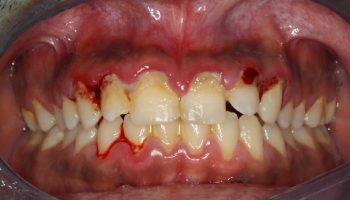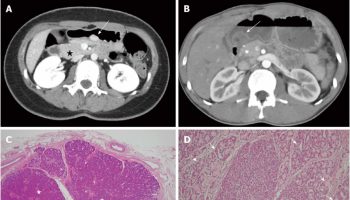Contents
What is trench mouth
Trench mouth also known as necrotizing ulcerative gingivitis or Vincent’s stomatitis, is a rare but severe form of gingivitis (inflammation of the gums or gingiva) that causes painful, infected, bleeding gums, ulcerations and halitosis (bad breath). The term trench mouth comes from World War I, when this infection was common among soldiers “in the trenches”, presumably due to multiple risk factors including poor oral hygiene, intense psychological stress, and malnutrition 1). Trench mouth is rare today in developed nations, though it’s common in developing countries that have poor nutrition and poor living conditions. Trench mouth is also increasingly being seen in patients with an immunocompromised condition, especially HIV-infected patients 2). Tobacco smoking 3), preexisting gingivitis, and trauma have been reported as predisposing factors of trench mouth 4).
Trench mouth is rare. When it does occur, it most often affects people ages 15 to 35.
Contact a dentist if you have symptoms of trench mouth, or if fever or other new symptoms develop.
The goals of treatment are to cure the infection and relieve symptoms. Your health care provider may prescribe antibiotics if you have a fever.
Good oral hygiene is vital to the treatment of trench mouth. Brush and floss your teeth thoroughly at least twice a day, or after each meal and at bedtime, if possible.
Salt-water rinses (one half teaspoon or 3 grams of salt in 1 cup or 240 milliliters of water) may soothe sore gums. Hydrogen peroxide, used to rinse the gums, is often recommended to remove dead or dying gum tissue. Chlorhexidine rinse will help with gum inflammation.
Over-the-counter pain relievers may reduce your discomfort. Soothing rinses or coating agents may reduce pain, especially before eating. You may apply lidocaine to your gums for severe pain.
You may be asked to visit a dentist or dental hygienist to have your teeth professionally cleaned and to have the plaque removed, once your gums feel less tender. You may need to get numb for the cleaning. You may need frequent dental cleaning and examinations until the disorder is cleared.
To prevent the condition from coming back, your doctor / dentist may give you instructions on how to:
- Maintain good general health, including proper nutrition and exercise
- Maintain good oral hygiene
- Reduce stress
- Stop smoking
Avoid irritants such as smoking and hot or spicy foods.
Figure 1. Trench mouth disease
Is trench mouth contagious?
No. Trench mouth is caused by periodontopathic bacteria, mainly spirochetes and oral anaerobes that can also be detected in healthy mouth 5). Trench mouth is presumably due to multiple risk factors including poor oral hygiene, intense psychological stress, and malnutrition 6).
Things that increase your risk of trench mouth include:
- Emotional stress (such as studying for exams)
- Poor oral hygiene
- Poor nutrition
- Smoking
- Throat, tooth, or mouth infections
Trench mouth causes
Trench mouth is a painful form of gum swelling (gingivitis). The mouth normally contains a balance of different bacteria. Trench mouth occurs when there is too much pathologic bacteria. The microbiota composition associated with trench mouth and found in lesion layers includes Treponema spp., Selenomonas spp., Fusobacterium spp., and Prevotella intermedia 7). Other microorganisms have also been described, although these were defined as “variable” flora and were not present in all cases 8). The gums become infected and develop painful ulcers. Viruses may be involved in allowing the bacteria to grow too much.
Things that increase your risk of trench mouth include:
- Emotional stress (such as studying for exams)
- Poor oral hygiene
- Poor nutrition
- Smoking
- Throat, tooth, or mouth infections
The proposed mechanisms to explain the association between psychological stress and trench mouth are based on reductions of the gingival microcirculation and salivary flow, increases in adrenocortical secretions which are associated with an alteration in the function of polymorphonuclear leukocytes and lymphocytes 9). Besides, psychological stress alters not only the immune response but also the patient’s behavior and mood, leading to inadequate oral hygiene, malnutrition, or increased tobacco consumption 10). Regarding the poor diet, decreasing dietary protein results in an increase in histamine concentration and that leads to a hyperemia of the gingival due to increased capillary permeability and decreased polymorphonuclear leukocytes chemotaxis 11).
Trench mouth prevention
Trench mouth preventive measures include:
- Good oral hygiene. That means brushing your teeth for two minutes at least twice daily — in the morning and before going to bed — and flossing at least twice a day. Better yet, brush after every meal or snack or as your dentist recommends. Flossing before you brush allows you to clean away the loosened food particles and bacteria.
- Regular professional dental cleaning and exams. See your dentist or dental hygienist regularly for cleanings, usually every six to 12 months. If you have risk factors that increase your chance of developing periodontitis — such as having dry mouth, taking certain medications or smoking — you may need professional cleaning more often.
- Good general health. Practices such as healthy eating and managing blood sugar if you have diabetes also are important to maintain gum health.
- Good nutrition
- Learning ways to cope with stress
- Stopping smoking
Trench mouth symptoms
Symptoms of trench mouth often begin suddenly. They include:
- Bad breath
- Crater-like ulcers between the teeth
- Fever
- Foul taste in the mouth
- Gums appear red and swollen
- Grayish film on the gums
- Painful gums
- Severe gum bleeding in response to any pressure or irritation
Trench mouth possible complications
Complications of trench mouth include:
- Dehydration
- Weight loss
- Loss of teeth
- Pain
- Periodontitis
- Spread of infection
Trench mouth diagnosis
Your health care provider will look into your mouth for signs of trench mouth, including:
- Crater-like ulcers filled with plaque and food debris
- Destruction of gum tissue around the teeth
- Inflamed gums
There may be a gray film caused by broken down gum tissue. In some cases, there may be fever and swollen lymph nodes of the head and neck.
Dental x-rays or x-rays of the face may be taken to determine how severe the infection is and how much tissue has been destroyed.
Trench mouth disease may also be tested for by using a throat swab culture.
Trench mouth treatment
The treatment of trench mouth should be organized in successive stages:
- First, treatment of the acute phase;
- Second, treatment of the preexisting condition;
- Third, corrective treatment of the disease complications;
- finally, supportive or maintenance phase.
Treatment of the acute phase has two main objectives of therapy: to stop the disease process and tissue destruction and to control the patient’s general feeling of discomfort and pain that interfere with nutrition and oral hygiene practices. These targets can be achieved by a careful superficial ultrasonic debridement and chemical detersion of the necrotic lesions with oxygen-releasing agents “local oxygen therapy” 12). The use of systemic antibiotics may be considered in cases that show unsatisfactory response to debridement or show systemic effects (fever and/or malaise). Metronidazole (250 mg, every 8 hours) may be an appropriate first choice of drug because it is active against strict anaerobes 13). Other systemic drugs have also been suggested, with acceptable results, including penicillin, tetracyclines, clindamycin, amoxicillin, or amoxicillin plus clavulanate 14). Conversely, locally delivered antimicrobials are not recommended because of the large numbers of bacteria present within the tissues, where the local drug will not be able to achieve adequate concentrations 15). Antifungal agents are, especially, indicated in immunodepressed patients who are undergoing antibiotic therapy 16).
Once the acute phase has been controlled, treatment of the preexisting chronic condition, such as preexisting chronic gingivitis, should be started, including professional prophylaxis and/or scaling and root planning. Oral hygiene instructions and motivation should be enforced. Existing predisposing local factors, such as overhanging restorations and interdental open spaces, should be carefully evaluated and treated. Systemic predisposing factors including smoking, adequate sleep, and reduction of stress should be controlled and taken into consideration 17). Sometimes, the correction of the altered gingival topography caused by the disease should be considered because gingival craters may favor plaque accumulation and disease recurrence. Gingivectomy and/or gingivoplasty procedures may be helpful for treatment of superficial craters; periodontal flap surgery, or even regenerative surgery, is more suitable options for deep craters or for necrotizing ulcerative periodontitis 18).
Finally, if proper maintenance is not carried out, relapses are likely to occur that may lead to a loss of attachment. Moreover, the main goal of this phase is complying with the oral hygiene practices and controlling the predisposing factors 19).
Trench mouth prognosis
The infection usually responds to treatment. Trench mouth can be quite painful until it is treated. If trench mouth is not treated promptly, the infection can spread to the cheeks, lips, or jawbone. It can destroy these tissues. A good compliance with the oral hygiene practices and maintenance do guarantee better and stable outcomes.
References [ + ]






